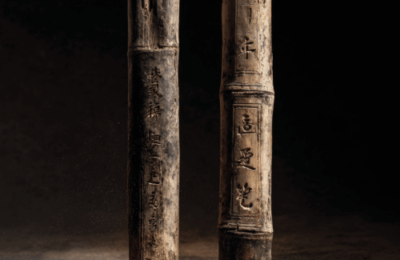《夕阳坡楚简|竹简上的宗祠匾额》
在湖南常德夕阳坡的静土里,棺旁只放着两根竹简,没有甲胄、没有玉器、没有漆器,只有两行刻得极薄的字,像是一座只挂两块匾额的私人宗祠。这并非遣策,而是墓主替自己写下的“个人精神匾额”:一行记录时代,一行记录自己。在短短五十四字中,他把个人命运与国家历史牢牢绑定,把一生的价值浓缩成唯一愿意带入永恒的证明。夕阳坡的无名楚人让我们看到,小人物也能用最轻的材质承载最重的意义——人之所以被记住,不在于拥有什么,而在于选择把什么刻进永恒。In the quiet earth of Xiyangpo in Changde, Hunan, only two bamboo slips lie beside the coffin—no armor, no jade, no lacquered treasures, just two thin lines of script like a private ancestral hall with only two plaques. These are not burial inventories but the tomb owner’s “personal spiritual plaques”: one line for the world, one line for himself. Within fifty-four characters he binds his life to a turning point in history, compressing the worth of a lifetime into the only proof he chooses to carry into eternity. This unnamed Chu man from Xiyangpo shows us that even ordinary people can let the light of meaning survive time—not through what they owned, but through what they carved into forever.

